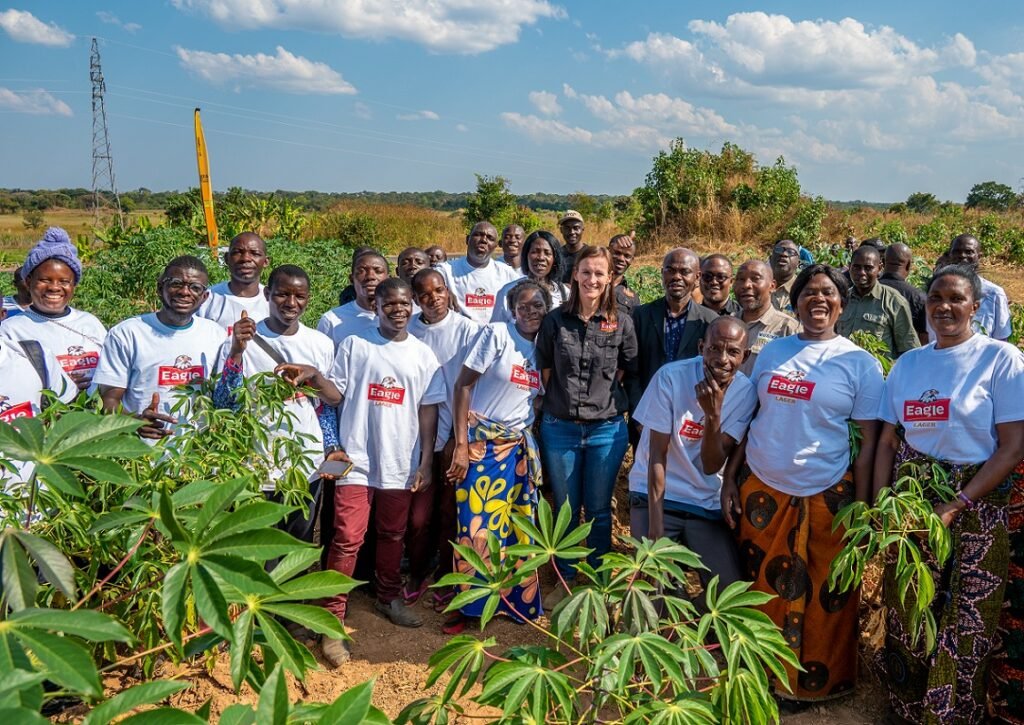By Noel Iyombwa
Once a neglected subsistence crop, cassava is increasingly being considered one of Zambia’s most profitable cash crops due to its growing use as a raw material in the brewing industry. The country’s Luapula Province, where more farmers are commercially growing the crop, is emerging as a regional cassava hub.
“Recently Zambia has witnessed a surge in cassava demand for both human consumption and industrial production, making it the next big thing. All eyes are on Luapula Province, where cassava farming is becoming a popular practice,” said Luapula Province Agricultural Coordinator Godwin Chate. Local farmers have for many years grown maize with very little to show for their sweat. Many challenges, long wait between one maize season and the next, rendered them idle and poor.
To address these challenges and ensure year-round viable economic activity in the province, Mr Chate along with his team sought to promote agricultural diversification in a bid to improve the farmers’ livelihoods. They negotiated a partnership with Zambian Breweries, which assisted the community in venturing into farming climateresistant cassava. Over 6,000 small-scale farmers have benefitted from Zambian Breweries’s support through an out-grower scheme where they receive equipment and training since its inception of the collaboration 2020.
Zambian Breweries Corporate Affairs Director Tawanda Hojane said that the company believes in empowering local communities and creating sustainable partnerships.
“Our operations model not only ensures the quality of our products, but also contributes to the economic growth of the region where we are present. Zambian Breweries continues to enhance agricultural diversification in Luapula Province, providing market opportunities, training and support to local farmers. Its ‘seed to sip’ approach involves directly sourcing cassava from small-scale farmers and thereby creating a sustainable value chain that contributes to the brewing of its renowned local beer brands Eagle Lager and Mosi Light,” said Mr Hojane. The next phase of the collaboration involves support for farming cooperatives so that they too can follow recommended practices and improve their yields.
The company recently extended support for sorghum growing in Zimba District of Southern Province in Zambia. Alfred Sianjase, District Agricultural Coordinator from the Ministry of Agriculture, expressed the government’s desire to see more small-scale farming undertakings in the area transformed into viable and sustainable businesses.
He acknowledged the vital role of agriculture in job creation and highlighted the economic benefits that sorghum farming in Zimba would bring to the district and the country as a whole. “Such opportunities are rare. We therefore urge our farmers to grasp this and use it wisely. The idea is for the farmers to produce profitably.
You will be able to improve your income at household level. When there is improvement in household income, there is also improvement in the district’s economic welfare, which ultimately develops the country economically. Five years ago, Zambia Breweries initiated a partnership with 200 farmers in the region. Today, the sorghum programme is very instrumental in equipping farmers with essential inputs and vital sorghum cultivation skills through conservation farming that benefit over 1,500 farmers,” he said.
“This programme has enabled them to thrive in modern agriculture while also providing a critical ready market, thereby fostering financial inclusion, and contributing to rural development and empowerment.” Each harvest season, the brewing company purchases over 4,000 metric tonnes of sorghum from local farmers, which is utilized in the production of Eagle Lager.
“As a business, Zambian Breweries prioritises local sourcing to empower local farmers and create job opportunities. Through value addition, we aim to contribute to national income, reduce reliance on imports, and foster industrialisation,” Mr Hojane said.

